- Home
- Ian McDonald
King of Morning, Queen of Day Page 12
King of Morning, Queen of Day Read online
Page 12
So, up the slope went I, thrashing at the briars with my stout stick and calling out the girl’s name, for all the good it would do in that din, not able to see more than two inches in front of me, slipping and sliding and be-jasusing and cursin’ like a bloody heathen, God forgive me. I think I must have climbed for half an hour, then all of a sudden I was out of the trees on the slopes of the mountain. The wind was cruelly fierce now—near blew me clean away, it did—and I was so wet by now it’d’ve made no difference if I’d chucked off my oilskins and gone up that mountain bare-arse naked. My hands were so cold and numb they could scarce hold the lantern. Looking about me I saw strung out across the hillside the lamps of all the other lads who’d come out to search for the lost girl. I stood a while taking my bearings. I had the feeling of something in front of me—something huge and dark, cold and hard, which I could not see. I edged forward, cautious as a cat on a precipice, God alone knows why. I suppose it was that wood had spooked me. Then, all of a sudden, I knew what that dark shadow was. ’Twas the Bridestone.
Well, that brought me up proper and short, for this night the thing seemed twice as tall and thrice as wide as Ben Bulben itself, and think what you may, but that night, that block of stone felt almost alive, as if all those strange feelings that had been following me through the wood were coming from this heathen slab of stone. Well, my friends, there I was, standing like an idiot in front of this great stone, and it humming like a bee, I swear, with the rain just streaming down me, when I heard the sound. ’Twas the sound of someone crying—someone not more than two steps from me, else I would not have heard them over the wind. I knew this was no trick of the night. This was mortal flesh and blood. Raising my lantern high, I ventured forward with what small boldness I could muster, and ’twas there that I found her, the lost girl, sheltering in the lee of the big stone.
Well, a proper sight she was, sobbing and weeping and shivering and muttering over and over to herself these words, “Why don’t they come? Oh, why don’t they come, why don’t they come?” Just those words, over and over and over. A sight she was, hair all lank and plastered flat by the rain, and dressed in nothing but what seemed in my poor lantern light to be a old wedding dress, torn and slashed most terribly. Barefoot she was, not a word of shoes or stockings.
So, what did this fellow do? Blowed his lungs out down that police whistle, that’s what he did. And all across the hillside those little bobbing lights froze stock-still, and then came running toward me. I don’t think the girl even knew I was there until I started blowing the whistle. She looked up all startled and I saw her eyes looking square at me and, boys, I don’t mind telling you, what I saw there fair knocked the blow out of me. Her eyes were empty, boys. Nothing there. Nothing. Not even sockets. Just darkness—a dark, empty space, with things like, well, I don’t know, like faraway stars, shining in them. I can see it yet, my friends.
At the sight of all the rest of the lads arriving posthaste, she upped and ran, like the billy-o. I tell you this, if she’d been a filly in the Sligo Races, I’d’ve made a bob or two out of her. I shouted at her to come back, but, well, that was a waste of time, with the wind roaring and howling so I could hardly hear myself. So I set off after her. She went up those slopes like a prize greyhound. Never seen anyone so fleet of foot, and her five months gone. There was I, slipping and sliding and be-jasusing trying to keep up, and she was getting farther and farther ahead of me. I looked up to see where I was, for I’d lost track of my bearings again, not being a creature graced with a great head for heights, and what I saw then, well, I don’t mind telling you, it queer froze my heart. It was like mist, like a thick fog, pouring off the top of the mountain. Like a great river it was. Why, it seemed to me it was almost solid, rolling down the slopes of the mountain. But it was red, Red fog. And in a wind that would have torn any normal fog to tatters. Now do you understand why I stood paralysed in mortal fear? No natural fog, this. The Desmond girl, she stopped the same as I had, and she looked at this red fog spilling down the mountainside. Then she turned and looked at me, at all of us, struggling up that hillside in the pelting rain, and the look on her face was as if she was seeing the thing she had wanted most in all the world. Like an angel’s, that face—like a sinner at the gates of heaven. That look I will never forget—no sir, not as long as I live. Then she turned and walked very slowly, very deliberately, into the red fog.
It swallowed her up, as completely as if she had never been, and then the fog, that unholy fog, I tell you, it stopped. Stopped dead. And, just as it had come spilling down the hillside, it rolled back again, up the slopes, over the top of Ben Bulben, and vanished. Of the girl who walked into the fog, the Desmond girl, there was not a trace. We went back there the next day and went over every inch of that hillside and didn’t find so much as a hair. And that’s as true as I’m standing here. And if you think I’m a liar, you ask of the others who were there that night. They will all testify my story is true. But, you ask, as I ask, and ask myself often, what of the girl? What happened to young Emily Desmond and her unborn child? Who knows? Who will tell what happened to her? No one.
PART II
THE MYTHLINES
So we set our eyes not on what is seen, but on what is unseen.
For what is seen is temporary, but what is unseen is eternal.
—2 Corinthians 4:18
1
TWENTY MILES GONE AND nothing to be done. Through rain, and rain, and pissing rain, and anagrams. The pissing rain had started two miles out of Dundalk, just where the road paid nodding acquaintance with the Catholic cemetery. With eighteen miles and the mountains before him, Gonzaga had lapsed sullenly into Nagmara. The smaller, darker man always reverted to speaking in anagrams when he was not happy. Solving the anagrams provided Tiresias, who was taller, thinner, and greyer, with a welcome intellectual diversion from the brainless formalities of boot before boot, mile after mile, through rain, and rain, and pissing rain. Where feather rags of cold, sodden cloud reached down the hillsides to touch Ravensdale Wood, Farmer Mulvenna of Jonesborough passing with his pigs and his new Ferguson tractor on his way over the border to Newry town bent down from his proud and lofty seat (a Ferguson tractor was an object of veneration in Jonesborough in 1930-something) to offer two saturated tramps a lift. If they didn’t mind sharing with the pigs in the trailer, that was.
“Sir, beggars cannot be choosers,” Tiresias had declared. “And, my dear Gonzaga, are we not the most mendicant of all that brotherhood? And is not the pig the most blessed of animals? The heathen Chinee consider doubly blessed the house that harbours a pig beneath its rafters, a sympathy unequivocally echoed by the citizens of these Four Green Fields of Ours. Do we not invite the fine pink gentleman to be our co-domiciliaries? Is it not a commonly maintained belief that, alone of all creatures, the noble pig was blessed by its Creator with the ability to see the wind? And, therefore, is it not fitting that we should also share with them this transport of delight, sharing, already, as I do, the gift of the discernment of things unseen?”
“Do youse want a lift, or do you want to stand there in the rain all afternoon gabbin’?” asked Farmer Mulvenna of Jonesborough. Gonzaga was already grubbing around in the muck and straw on the floor of the trailer for small, forgotten items for his sack. As Yeoman Mulvenna, his pigs, and his passengers jolted proudly onward to Newry town, Tiresias discoursed briefly on Chinese Taoist thought with relation to the Two Principles, illustrating his lecture with instructive fables from the Ching Dynasty. “You are aware, my dear Gogo, that in China the beggar was a person of some consequence? Many were members of mendicant guilds, and I cannot but think that it would serve us well to emulate their example. It was the established practice for a member of a mendicant order to bang a gong or blow a trumpet or in some other fashion contrive to make a general nuisance of himself until the citizenry paid sufficient for him to desist his efforts. Some, would you believe, Gogo, used to swing dead cats around their heads on a rope, doubtless causing not i
nconsiderable distress to the very great number of feline fanciers particular to that dynastic period. Indeed, Gogo, so well organised were the beggars of Classical China that a token annuity to the guild coffers from a merchant or householder would grant immunity from their solicitings for a whole year. I would dearly love a cup of Earl Grey, Gogo—dearly.”
“Haa! Fnoud eno!”
Gonzaga’s filth-smeared face smiled up from between the pink vaulted backs of Farmer Mulvenna’s pigs. Between his fingers he held a Free State penny. He wiped it clean, waved it triumphantly beneath Tiresias’s nose, then thrust it into the depths of a much-worn, more soiled trooper’s knapsack.
Twenty miles of rain, and nothing to be done, and rain, and anagrams; not one single worthy soul generous enough to save a tramp’s shoe leather by offering him a lift. In the temporary respite offered by the walls of a ruinous castle that stood picturesquely by the waterside, Gonzaga began to snuffle, nose to the ground, in search of further treasures for his sack. “On any other day, in any other weather, at any other season,” intoned Tiresias, watching the rain fall from the grey sky. Nothing found, they pressed on through countless millions of raindrops along the coast-hugging road, past the pines that demurely screened the seafront summer residences and the habits of their moneyed tenants from rude gazes. Before them rose the steeples and smokes of the village that was their destination, and beyond and above, the slopes of the mountains. Tiresias bade his colleague wait a moment while he admired the view.
“Comparable to the Corniche of Monte Carlo, or that oft-gloried road that wends south out of Naples, under the breath of Vesuvius, to Sorrento, would you not agree, Gogo? However, my boots are killing me. Or, to translate directly from the Irish, more grammatically than idiomatically, “the boots they do be killing me.”
They took a rest on the steps of a small obelisk erected with startling abruptness in an otherwise unremarkable cow pasture by the road.
“Erected in memory of Major Robert John Ross, who, in the War of 1814 with the colonials, actually succeeded in capturing and burning the White House, but not before he had helped himself to the presidential repast, still hot on the table, and liberated the presidential wine cellar. Apparently, it was quail on the menu.” Tiresias read from the legend engraved upon the stone as, grumbling and gasping, he eased off his boots; left, then right. “Oh, Gogo, ah; the simple ecstasies are the most profound. Oh… ahhh…” Gonzaga picked up flakes of stone shed from Major Robert John Ross’s stab at immortality and inspected them minutely before discarding them over his shoulder.
“Time, methinks Gogo, for a quick survey, after which we shall partake of the marvellous restorative qualities of Earl Grey’s unexcelled chai.” From a waistcoat pocket Tiresias unfolded a pair of thick, square spectacles. Harlequin colours swirled and ran in the lenses. Wire frames were carefully hooked over scrofulous ears.
“Scofu? Snexu?”
“A modicum of time, if you please, while my weary old visual systems acclimatise… yes, there’s something manifesting. The mythline flow follows the geomorphological landscape quite closely. Evidently there was no human settlement and mythic activity before the landscape stabilised after the Ice Age. I can distinguish a tangle of minor nodes along the river valley and there seems to be an octave of decayed myth-echoes along the shoreline. The place we’re pacing with our singular posteriors is the focus of one such old, decayed echo, in all probability the site of an Old Stone Age hamlet. This whole place is quite a jumble. I’m trying to sort out the major octaves from the minor harmonics. Yes… yes, I’ve got them now. Here, Gogo, see where I am pointing?” Gonzaga hunkered and squinted along Tiresias’s quavering forefinger. The old man was indicating a low, flat-topped mountain at the edge of the mass that formed such a picture-postcard backdrop to the village in the valley.
“Draloch snexu?”
“Major chordal nexus,” Tiresias confirmed. “Right on the summit.” The square glasses were unpeeled from the prominent proboscis, adoringly folded in vellum, and returned to the next-to-heart pocket. “Good comrade, how about that long-promised cup of liquid nectar? Time aplenty tomorrow for the setting about of ordained businesses. Tonight we rest, we recreate, we take our easance and pleasure in Rostrevor Village.” Oily locks that had not seen the comb for over a generation nodded at clouds ripping and tearing under the weight of their own rain. An aqueous, ochre evening light spilled down the mountainsides and poured over the village. “See, dear Gogo, even the elements themselves have deigned to smile upon us.”
“Wentyt slime gneo, dna gnithno ot eb edno,” grumbled Gonzaga, reaching into the wet grass and pocketing a discarded cap from a bottle of Cantrel and Cochrane red lemonade. He took a small metal cylinder from the webbing bandolier he wore slung across his shoulder, opened the cap, tipped a few grains of black tea into the iron pot that swung from his belt. “Oyu ekam erif. Ym tfee thru.”
2
PIG PAWS, PIG FACES, big pig men, bog men, up for the day from Mullingar and Kildare, plonked around the tables like sides of fatty ham, wedged apoplectically into straining tweeds and moleskins, They always sat as far from their women as the geometry of the tables would permit. Faced with lard dumplings swaddled in floral print, with cheeks like two tins of condemned veal, they could hardly be blamed for wanting to put as much distance as possible between themselves and their darling wives. What is it about Irish womanhood that aspires to the condition of massive mono-bosoms and mono-bottoms? What is the secret source of that peculiar bouquet of Eau de Farmer’s Wife that envelops them, a heady amalgam of middle-aged secretions and fat heated by its own compression to the point of spontaneous combustion?
Jessica hated Tuesdays with a cordial loathing: Tuesdays, when the shopping specials disgorged their wobbling hordes of red-cheeked rurals onto the platforms of Connolly and Pearse stations and herded them like prize Landrace pigs toward the glittering sties of Clery’s, Brown-Thomas, Switzers. Watching their jowls shudder as their teeth chomped down another forkful of meat and two veg, she imagined a little ditty running around and around behind their piggy eyes: Yum yum, pig’s bum, cabbage and potato; yum yum, pig’s bum, cabbage and potato…
The better class of client—the solicitor, the bank clerk, the accountant, the broker, the department store floorwalker—took his custom far beyond the reach of farmers and their wives on Tuesdays, and for the deprivation of their tips and their ritual, depersonalised flirtations, she despised the pig people. Tuesdays she would forever associate with the smell of boiling cabbage in big vats and the rhythmic chomp of rural mastication.
Bang through the swinging doors into the steam heat and stench of the kitchen. Clatter of plates into the sink; a glance at the clock, which seemed to be running slow, seemed not to have moved one iota, seemed to be running backwards; a sigh, a stretch against the cool of the refrigerator, a long “Oh God,” an unrequited lust for a Woodbine cigarette and then a swift reverse out through the banging swinging doors with four more platefuls of Shopper’s Special Luncheon. Swinging in as she went swinging out was her best enemy, Fat Lettie, with the inevitable taunt: “I think the bog man on table number six fancies you. He was asking after you—when you get off, and all…”

 Empire Dreams
Empire Dreams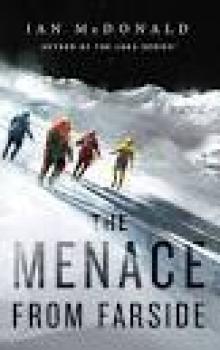 The Menace from Farside
The Menace from Farside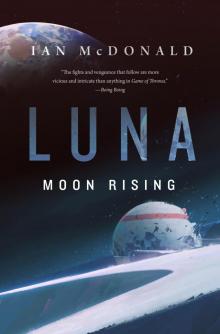 Luna: Moon Rising
Luna: Moon Rising Moon Rising
Moon Rising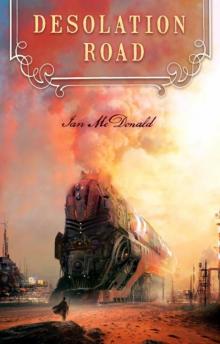 Desolation Road dru-1
Desolation Road dru-1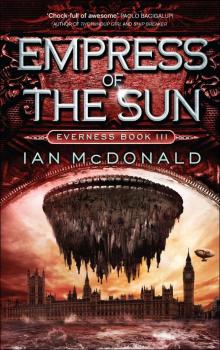 Empress of the Sun
Empress of the Sun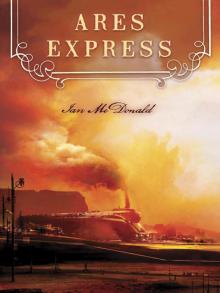 Ares Express dru-2
Ares Express dru-2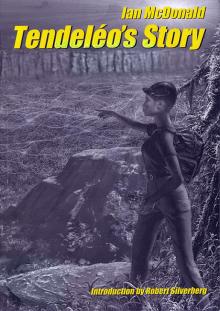 Tendeléo’s Story
Tendeléo’s Story River Of Gods
River Of Gods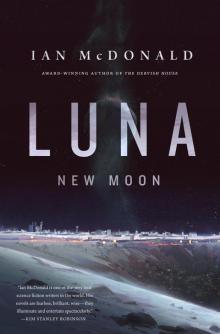 Luna
Luna![Cyberabad Days - [River of Gods 02] Read online](http://i1.bookreadfree.com/i1/03/29/cyberabad_days_-_river_of_gods_02_preview.jpg) Cyberabad Days - [River of Gods 02]
Cyberabad Days - [River of Gods 02]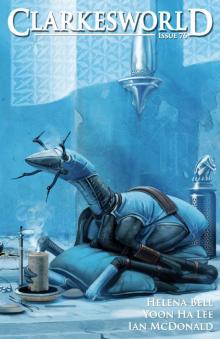 Clarkesworld Magazine Issue 76
Clarkesworld Magazine Issue 76 Brasyl (GollanczF.)
Brasyl (GollanczF.) Scissors Cut Paper Wrap Stone
Scissors Cut Paper Wrap Stone Chaga
Chaga Time Was
Time Was Cyberabad Days
Cyberabad Days Be My Enemy
Be My Enemy Changa
Changa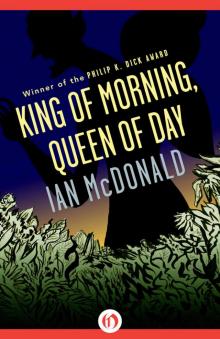 King of Morning, Queen of Day
King of Morning, Queen of Day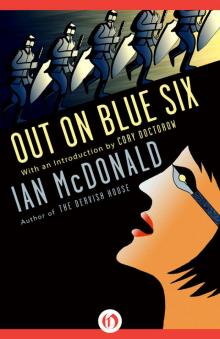 Out on Blue Six
Out on Blue Six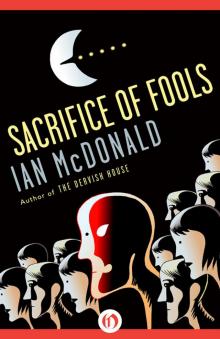 Sacrifice of Fools
Sacrifice of Fools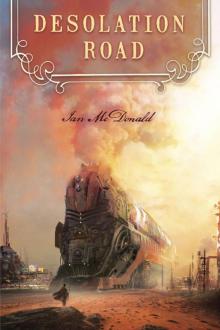 Desolation Road
Desolation Road Luna--Wolf Moon--A Novel
Luna--Wolf Moon--A Novel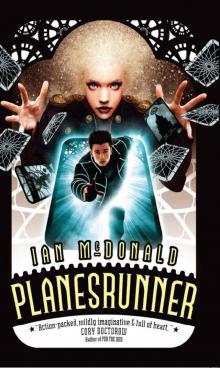 Planesrunner (Everness Book One)
Planesrunner (Everness Book One)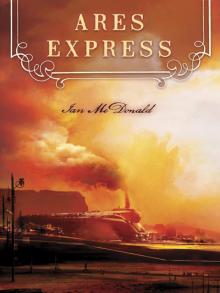 Ares Express
Ares Express